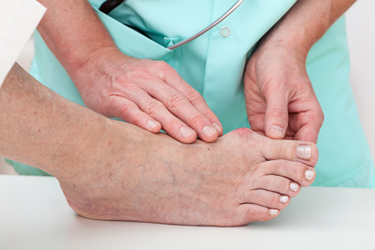 Podiatrists, or foot doctors, can take different approaches to treating bunions, which are structural deformities of the joint at the base of the big toe. This condition not only can cause pain but may also lead to a cascade of secondary foot problems, affecting mobility and quality of life. Initial treatment strategies may include non-invasive interventions aimed at alleviating symptoms and halting the progression of the deformity. Possible strategies include the use of custom orthotics designed to redistribute pressure away from the affected joint, targeted exercises to maintain joint mobility, and advice on appropriate footwear that accommodates the bunion without exacerbating discomfort. In more severe cases, podiatrists may recommend surgical intervention. This surgery, known as a bunionectomy, involves realigning the toe by correcting the abnormal angle of the bones, addressing the issue both cosmetically and functionally. If you have a bunion, it is suggested that you seek the care of a podiatrist who can recommend treatment options to prevent the condition from worsening.
Podiatrists, or foot doctors, can take different approaches to treating bunions, which are structural deformities of the joint at the base of the big toe. This condition not only can cause pain but may also lead to a cascade of secondary foot problems, affecting mobility and quality of life. Initial treatment strategies may include non-invasive interventions aimed at alleviating symptoms and halting the progression of the deformity. Possible strategies include the use of custom orthotics designed to redistribute pressure away from the affected joint, targeted exercises to maintain joint mobility, and advice on appropriate footwear that accommodates the bunion without exacerbating discomfort. In more severe cases, podiatrists may recommend surgical intervention. This surgery, known as a bunionectomy, involves realigning the toe by correcting the abnormal angle of the bones, addressing the issue both cosmetically and functionally. If you have a bunion, it is suggested that you seek the care of a podiatrist who can recommend treatment options to prevent the condition from worsening.
If you are suffering from bunions, contact Barbara J. Aung, DPM of Aung Foot Health Clinic . Our doctor can provide the care you need to keep you pain-free and on your feet.
What Is a Bunion?
A bunion is formed of swollen tissue or an enlargement of boney growth, usually located at the base joint of the toe that connects to the foot. The swelling occurs due to the bones in the big toe shifting inward, which impacts the other toes of the foot. This causes the area around the base of the big toe to become inflamed and painful.
Why Do Bunions Form?
Genetics – Susceptibility to bunions are often hereditary
Stress on the feet – Poorly fitted and uncomfortable footwear that places stress on feet, such as heels, can worsen existing bunions
How Are Bunions Diagnosed?
Doctors often perform two tests – blood tests and x-rays – when trying to diagnose bunions, especially in the early stages of development. Blood tests help determine if the foot pain is being caused by something else, such as arthritis, while x-rays provide a clear picture of your bone structure to your doctor.
How Are Bunions Treated?
- Refrain from wearing heels or similar shoes that cause discomfort
- Select wider shoes that can provide more comfort and reduce pain
- Anti-inflammatory and pain management drugs
- Orthotics or foot inserts
- Surgery
If you have any questions, please feel free to contact our office located in Tuscon, AZ . We offer the newest diagnostic and treatment technologies for all your foot care needs.





